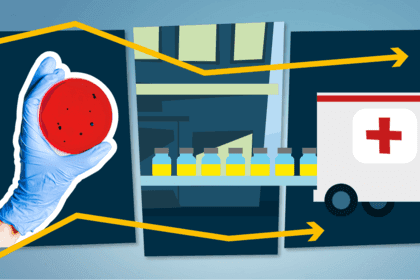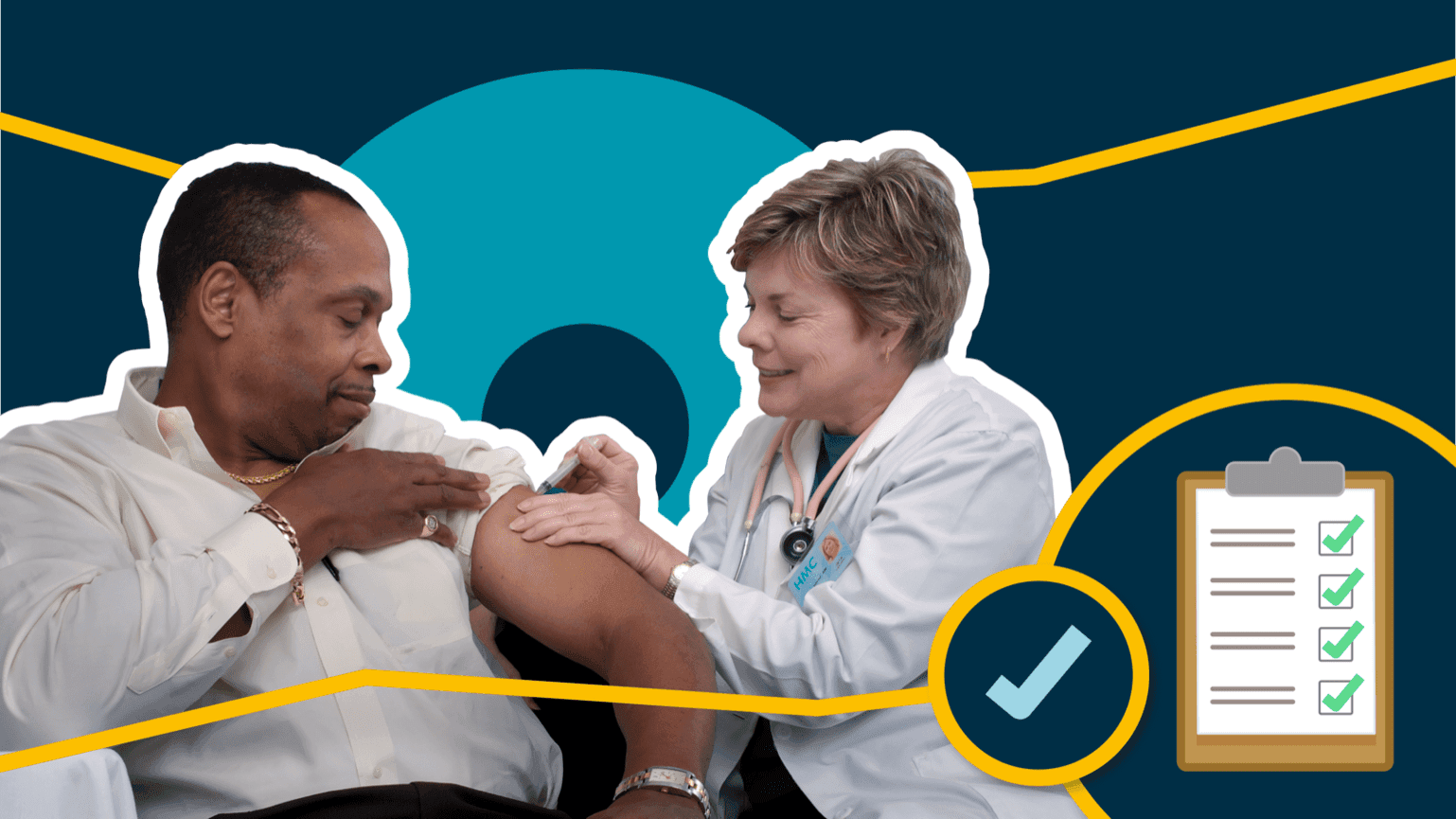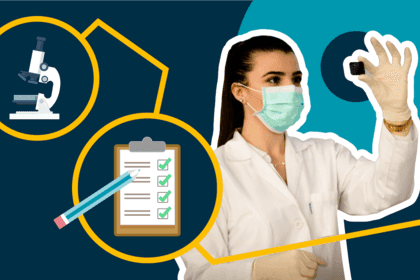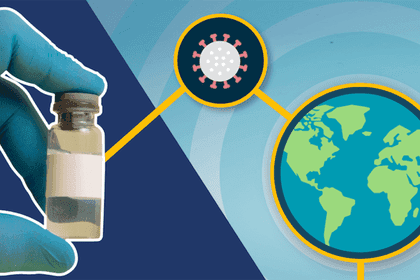
Safety first: how Covid-19 vaccines are tested
The first Covid-19 vaccines have been approved and are already being rolled out in parts of the world. But how are vaccines tested to ensure they are safe and effective, and how do the clinical trials they are put through work?

Chandan Khanna / AFP via Getty images
Vaccines typically take more than a decade to develop and license, but less than a year after scientists around the world received the genetic code for Covid-19 nine different vaccines are already approved for use, with another 50 or so undergoing clinical trials.
But although the development of Covid-19 vaccines has been much faster than for any vaccine before it, this doesn’t mean that safety has been compromised. Before any vaccine can be approved for use it must go through rigorous testing to make sure it is safe, as well as effective.
The process for Covid-19 vaccines has been no different. Instead, the speed of development this time round has been made possible by unparalleled global focus and funding, and by researchers, developers and funders collaborating to streamline processes, which meant developers could conduct some stages of the process simultaneously.
The phases of vaccine development
At the start of the development process, lab research helps scientists decide which components they might use in the vaccine and learn about the properties of each vaccine candidate.
This is followed by preclinical trials in animals to test if the vaccine induces an immune response and can protect against the disease. These animal studies also provide vital safety tests before the vaccine is given to humans.
If the vaccine passes these tests, it is then given to people through clinical trials. This process is what makes the difference between a promising vaccine and a proven one.
There are several phases, each building on the results of the one before it:
| Phase I | Testing for safety, including potential side-effects and dosage as well as preliminary information on protection and immune response | Requires 10-50 participants |
| Phase II | Testing whether the vaccine induces an immune response, and more safety testing | Requires hundreds of participants |
| Phase III | Understanding how well the vaccine protects against the disease, and continued safety assessment | Requires thousands of participants |
| If trials are successful, the vaccine will be submitted for regulatory review and approval. | ||
| Phase IV | Monitoring the vaccine after it has been licensed to look at how it compares to other licensed vaccines, its long-term safety and how it performs in different population groups over time. | |
In Phase I, the vaccine is usually given to a small number of healthy adult volunteers. The testing programme is then expanded during Phase II to match the demographic characteristics of the people for whom the vaccine is intended. In Phase III, trials often take place across multiple countries and populations. At each stage the vaccine’s performance is compared against a control group of people receiving a placebo.
Testing standards for vaccines are extremely high, because they are given to healthy people. With other drugs that people take every day to cure an illness, more side effects are often accepted as not taking the drugs would mean staying sick, while vaccines need evidence that they do not harm healthy people taking them.
Conducting clinical trials normally takes a long time, but in the case of Covid-19, the global nature of the pandemic, the extra funding available and the reach of the internet made recruiting participants easier and quicker. The fact that Covid-19 is so widespread meant that many participants in the clinical trials were exposed to the virus, so the results on protection by the vaccine were available within a shorter timescale.
If the trials have been successful, the evidence will be submitted for regulatory review and approval. But the testing doesn’t stop once a vaccine is approved; once in use it must be continuously monitored to ensure it remains safe and effective in the longer term, and to identify any rare side effects that may only show in one in a million people.
Pressing play on the video above will set a third-party cookie. Please read our cookie policy for more information.
The key principles of a vaccine clinical trial
1. Safe and ethical
The top priority is making sure that the trial is designed and conducted safely and ethically. Participation in a clinical trial must follow freely given, informed consent, and before a participant joins a trial, they must have all the information they need to understand what they are volunteering for.
To ensure the trials are as safe as possible for participants and that they are treated fairly and respectfully, national and international rules on ethics and safety are applied, and are enforced through regulation and inspection.
Before they can begin a trial, researchers must submit a detailed plan to independent ethics committees for approval, such as the Medicines and Healthcare products Regulatory Agency or the Food & Drug Administration. They check whether the planned trial offers a fair and transparent arrangement for research participants.
Most trials also have an independent data monitoring committee to ensure safety by monitoring things like reported side-effects, patient feedback and incoming results on an ongoing basis.
If a potential safety issue is discovered or a participant falls ill, the trial is usually paused while an investigation takes place. We saw this with the Oxford University-AstraZeneca vaccine, for which trials were resumed shortly afterwards. It is critical to quickly understand whether the participant’s illness has any relationship to the vaccine or if it is completely unrelated, and to share this data openly.
2. Scientifically sound
Wherever possible, clinical trials should be:
- Controlled: two or more groups are compared – one (or more) who receive a candidate vaccine, and a control group who receive a placebo.
- Randomised: each participant is put into one of these groups at random at the start.
- Blinded: the participants do not know whether they are having a test vaccine or a placebo. Nor do the researchers who administer the doses.
This ensures that there is no bias that could distort the results, and that researchers can be sure that any differences in outcomes between the groups are due to the vaccine received.
Trials must also be large enough to give statistical confidence in the data. Testing two people wouldn’t tell us much about whether a vaccine works, but testing 20,000 will mean we can have much more confidence in the results.
The Pfizer-BioNTech vaccine, for example, which has been approved in a number of countries, involved a clinical trial of more than 40,000 people, while the Moderna clinical trial involved 30,000. In both cases, around 50% of participants received the vaccine, with the other 50% making up the control group that were given a placebo.
3. Context-specific
Involving those who stand to benefit the most from the vaccine is key to the success of any clinical trial.
For example, we know that older people, men and those with co-morbidities are at greater risk of severe disease and death from Covid-19, so vaccine trials have involved these groups. In the Moderna vaccine trials, around 25% of participants were over 65 years of age, and also included a share of healthcare workers.
Participants in the Pfizer-BioNTech phase III clinical trials were of varying ages and included some minority groups. In total, over 40% of global participants came from racially and ethnically diverse backgrounds.
At this stage, most Covid-19 vaccines are not approved for use in children under 12 years or in pregnant women – that doesn’t mean there is an issue, or that it is unsafe; just that further trials are needed within these groups.
We’re also not just going to use Covid-19 vaccines in one country or sector of society – so trials need to involve diverse populations in different locations to make sure the vaccine is as effective as possible, for as many people as possible. A number of variants of the Covid-19 virus, which have the potential to affect the effectiveness of vaccines, have also been identified in different parts of the world.
Trials also need to be adaptable to different settings. For example, in the West African Ebola outbreak in 2014–16, conventional randomised control trials were not viable due to the large cost, time required and local acceptability. Given the urgency of the situation, other trial designs, better tailored to fit the circumstances, were used instead.
4. Collaborative and harmonised
In a pandemic, it’s vital for vaccine researchers to coordinate their activities, so their work can add up to more than the sum of its parts. The search for a Covid-19 vaccine has involved extensive international cooperation in conducting clinical trials, as well as in sharing the data.
During the Covid-19 pandemic, researchers and publishers have pulled together to publish their findings openly at an unprecedented rate, enabling the pace of vaccine development to be accelerated.
By harmonising their approaches, trial designs and data collected, researchers can contribute to the same large trials all over the world; results can be compared between sites and the data can be aggregated into much larger studies.
Once the results of the clinical trials are made available, a series of independent reviews of the evidence take place to determine how safe and effective the vaccine is, following guidelines by global organisations such as the World Health Organization. Regulatory agencies in individual countries can then decide whether to approve the vaccines and develop policies for how the vaccines should be used in their country.
5. Trustworthy and engaged with the public
Early public and community engagement is vital to ensure successful recruitment of participants, keep trials on track, and develop trust to support wider uptake of vaccines that are available. In the case of Covid-19, social media engagement has been key to recruiting sufficient participants within a very short timeframe.
Making sure that participants and their communities are engaged with and have a good experience during a trial is also important to ensure they keep supporting it. If participants drop out, this can delay the trial, or make it harder to base informed decisions on the results.
And wider public trust in clinical trials is essential if people are going to be willing to receive a new vaccine once it has been made available. As the different vaccine types are rolled out to the wider population, and more vaccines are approved, it is vital that data about its safety and effectiveness continues to be shared.
Early Covid-19 vaccines won’t be a silver bullet
The arrival of the first Covid-19 vaccines is great news; it will help prevent some people from becoming seriously ill and represents a major milestone towards gradually being able to get on with our lives. But more vaccines will need to be developed to ensure protection on a global scale.
Although some Covid-19 vaccines are already in use, these may not be a complete and immediate solution. We don't yet know how long immunity will last for, they might not be completely effective in all ages or appropriate in all health systems, and not everybody will be offered the vaccine straight away, or will want to take it.
We also know that some of the approved vaccines are expensive to produce and need to be stored at very cold temperatures, which can affect supply chains and prevent it reaching parts of the global community. Many of the current vaccines also require a second dose to be administered for maximum effectiveness, delaying immunity.
So it is important that research continues – well into future generations of Covid-19 vaccines. This means that governments and funders must continue to invest in clinical trials and different vaccine approaches.
Pressing play on the video above will set a third-party cookie. Please read our cookie policy for more information.
This explainer was first published on 11 September 2020.

